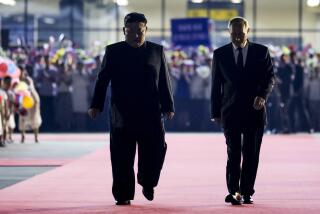Suspected Heir to N. Korea Has a Mickey Mouse Excuse
- Share via
TOKYO — A man identifying himself as the eldest son of North Korean leader Kim Jong Il was caught this week trying to enter Japan illegally using a forged Dominican Republic passport. He told authorities that he wanted to visit Tokyo Disneyland.
A senior South Korean official in Seoul said Thursday that the man detained was in fact the North Korean leader’s son, although Japan stopped short of positively identifying him--a move that analysts said could be intended to avoid embarrassing North Korea.
Immigration officials at Tokyo’s Narita airport became suspicious because the man, who arrived on a Japan Airlines flight from Singapore on Tuesday, did not have Latin features and wasn’t able to speak Spanish. He initially told police that he was from South Korea but later said he was Kim Jong Nam, 29.
The man left Japan this morning with his three companions on an All Nippon Airways flight to Beijing after a special bus drove them onto the tarmac.
Kim Jong Nam is the heir apparent in North Korea’s reclusive Stalinist state and, by all accounts, beloved and trusted by his father. “He is believed to be in line to lead the country,” said Masao Okonogi, a North Korea expert at Japan’s Keio University. “He’s a member of the royal family.”
The passport included stamps showing that it had been used twice last year to enter Japan. The Japanese government has no diplomatic relations with the Communist regime, so entering with North Korean papers is not an option.
The birth date on the man’s passport matched Kim’s: May 10, 1971.
The man was wearing black trousers, a T-shirt and a vest. He was accompanied by two women in their 30s and a 4-year-old boy--all believed to be family members. The four remained calm during questioning.
Few North Koreans outside the ruling circle are allowed to travel abroad with members of their family for fear that they will defect.
This week’s incident is only the latest in a string of strange events involving North Korea during the last decade. The regime has been accused in recent years of kidnapping film directors, masterminding bombings and forcing its diplomats to deal drugs to pay their travel expenses. The latest incident comes at a time when the North is trying to convince Washington that it is not a terrorist state and can play by global rules.
Kim Jong Nam studied computer science in Switzerland and heads a top North Korean committee on information technology. Some North Korea watchers speculate that Kim, if he is in fact the man caught in Japan, may have hoped to assess and report back to his father on Japan’s high-tech industries, perhaps out of concern that the North Korean regime was not getting adequate intelligence.
Another theory holds that he is trying to see more of the world as part of his training to eventually take over as his nation’s leader. He traveled with his father to China in January when a North Korean delegation visited the Shanghai Stock Exchange, an auto plant and high-tech factories.
Analysts rejected suggestions that he was trying to defect or had come seeking medical treatment.
Relatively little is known about North Korean leader Kim Jong Il’s personal life. South Korean experts say he is believed to have three children, each by a different mother: Kim Jong Nam; a daughter, Kim Sul Song, born in 1974; and a younger son, Kim Jong Chul, born in 1981.
Kim Jong Nam has been described as a gentle and intelligent man who keeps largely out of the public eye. One bit of undated footage broadcast on Japanese television Thursday showed the elder Kim in a cavernous North Korean hall, urging his son to sit on the dais because he will one day take over the leadership.
North Korea expert and former journalist Toshimitsu Shigemura said that the detainment--assuming the man held by authorities was Kim--prompted Japan to make some difficult diplomatic calculations. Tokyo harbors deep resentment toward the Communist regime over the kidnappings of several Japanese citizens at the hands of North Korean agents, and the reclusive nation remains on the U.S. list of states that allegedly sponsor terrorism.
The Japanese government could have taken a tough line in a bid to exchange the man identified as Kim for the kidnapping victims. But it apparently opted to quietly return him by way of China, hoping to earn goodwill for later negotiations.
*
Chi Jung Nam in The Times’ Seoul Bureau contributed to this report.
More to Read
Sign up for Essential California
The most important California stories and recommendations in your inbox every morning.
You may occasionally receive promotional content from the Los Angeles Times.













